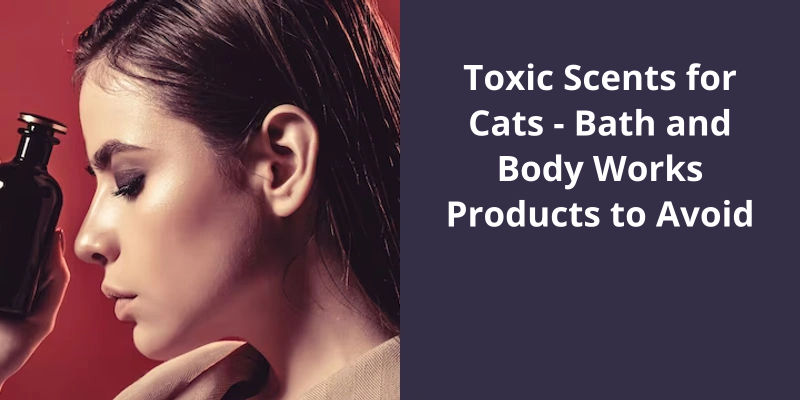Toxic scents for cats include various essential oils and fragrance products that are often found in our homes. Crucially, many items from retail stores like Bath and Body Works can be hazardous to your feline companion. These potentially unsafe products span from candles to wall plug-ins, room sprays, and even soaps containing harmful components. Essential oils like citrus, eucalyptus, cinnamon, pennyroyal, peppermint, pine, sweet birch, wintergreen, and ylang ylang are especially harmful. Overexposure to these scents, even if diffused in the air, can lead to symptoms such as drooling, vomiting, tremors, difficulty walking, and in severe cases, liver failure in cats. Therefore, cat owners must be mindful of the products they use around their pets, ensuring they don’t pose a risk to their health.

Are Bath and Body Works Candles Safe for Cats?
However, it’s important to note that some cats may be more sensitive to the scents and chemicals found in these products than others. If your cat seems to experience any respiratory distress or exhibits any unusual behaviors when near such products, it’s best to consult with a veterinarian to determine if there’s a potential for harm.
When it comes to Bath and Body Works candles specifically, the company claims that their candles are made with safe and high-quality ingredients. They state that their candles have undergone extensive safety testing to ensure that they’re safe for use around pets and humans alike. Despite this, some cat owners may still have concerns about the potential for harm, especially given the strong scents and chemicals often present in scented candles.
While paraffin wax is generally safe for use in candles, some cat owners may prefer to use candles made from natural waxes such as soy or beeswax, which are considered to be more eco-friendly and less likely to release harmful chemicals into the air.
If you’ve any concerns about the potential for harm, it’s always best to consult with a veterinarian to determine the best course of action.
Alternatives to Bath and Body Works Candles That Are Safe for Cats
If you’ve a cat at home, you might be concerned about the safety of using scented candles, especially the ones from Bath and Body Works. Ingestion of these candles could cause harm to your feline friend. Thankfully, there are several alternatives to Bath and Body Works candles that are safe for cats. Some examples include soy candles, beeswax candles, and coconut oil-based candles. These alternatives are typically made with natural ingredients that are less harmful to pets.
It’s important to be mindful of your feline friends and their sensitivities when it comes to personal hygiene and beauty routines. While you may love the scent of a favorite perfume, it could pose a serious health risk to your furry companion. In this article, we will explore the dangers of perfume for cats and offer alternative solutions for a fragrant and feline-friendly lifestyle.
Can I Use Perfume When I Have a Cat?
Perfumes contain a variety of synthetic chemicals that can be harmful to cats. These chemicals include phthalates, which can cause hormone disruption, and formaldehyde, which is a known carcinogen. Even small amounts of exposure to these chemicals can cause severe health issues for cats. Ingesting perfume can lead to vomiting, diarrhea, and serious organ damage.
Additionally, cats are highly sensitive to scent and are prone to respiratory issues. The strong scents of perfumes can exacerbate these issues and even cause difficulty breathing. This is especially true for cats who already have respiratory issues. Exposure to perfumes can also cause excessive sneezing and coughing, leading to discomfort for your furry friend.
Instead, opt for natural, unscented products such as baking soda or vinegar to freshen up your home. If you do decide to use perfumes or scented products, be sure to keep them out of your cats reach and avoid applying them directly to your cats fur.
It isn’t recommended to use perfume when you’ve a cat in your home.
What Are the Signs of Perfume or Scent-Related Toxicity in Cats?
Perfume or scent-related toxicity in cats can be indicated by a range of physical symptoms, including vomiting, diarrhea, drooling, breathing difficulties, lethargy, and seizures. Other signs may include skin irritation or excessive grooming and licking. If you suspect your cat has been exposed to toxic substances, it’s important to seek veterinary care immediately.
Source: Wearing Fragrance Around Pets
As pet owners, ensuring the safety of our furry friends is a top priority. While we may love the fresh scents provided by air fresheners like Bath and Body Works Wallflowers, it’s important to be aware of the potential dangers they can pose to our pets. In particular, the essential oils contained in these products can be extremely harmful to cats. In this article, we’ll take a closer look at the risks of Bath and Body Works air fresheners for cats and what steps you can take to protect your pet.
Is Bath and Body Works Air Freshener Toxic to Cats?
These essential oils, such as cinnamon, clove, and eucalyptus, can cause serious harm to your cats respiratory, nervous, and digestive systems. Inhaling these oils can cause coughing, sneezing, and difficulty breathing, while ingestion can lead to vomiting, diarrhea, and even seizures. Some cats may be more sensitive to these oils than others, so it’s important to closely monitor your pets behavior if you use these air fresheners in your home.
In addition to the risk of ingestion and inhalation, Bath and Body Works Wallflowers can also pose a risk to your cat through skin contact. If the oils come into contact with your cats skin or fur, they can cause irritation, rashes, and even chemical burns. This is especially true if your cat licks or grooms themselves after coming into contact with the oil. Keeping your cat away from these air fresheners altogether is the best way to avoid these risks.
The symptoms of toxicity can vary depending on the level of exposure and the individual cats sensitivity to the oils. Your vet may recommend a course of treatment, including hospitalization, IV fluids, and supportive care to help your cat recover.
To prevent accidental exposure to air fresheners like Bath and Body Works Wallflowers, it’s important to keep them out of reach of your pets. This includes storing them in cabinets or high shelves, and avoiding using them in rooms where your pets spend a lot of time. It’s also a good idea to switch to natural air fresheners that don’t contain potentially harmful essential oils.
If you do use these air fresheners, it’s important to keep them out of reach and monitor your pets behavior closely for signs of exposure. If you suspect that your cat has been exposed, seek veterinary attention immediately. By taking these precautions, you can help keep your pets safe and healthy.
If you’re a cat owner, you know that they’ve an incredibly sensitive sense of smell. As such, it’s important to choose scent products that won’t harm your furry friend. Luckily, there are plenty of non-toxic scents and pet safe essential oils that are gentle on cats. Here is a list of some of the best options out there.
What Scent Products Are Safe for Cats?
As pet owners, we want to keep our furry friends safe and healthy at all times. Thats why it’s important to be mindful of the scent products we use around them. Many perfumes, air fresheners, and candles contain harmful chemicals that can be toxic to cats and dogs. When it comes to scent products that are safe for cats, it’s best to opt for natural, non-toxic options.
One of the safest scents for cats is myrrh. This essential oil has a warm, earthy scent that can help with relaxation and promote a sense of calm. Myrrh oil is often used in aromatherapy to reduce stress and anxiety in cats. It’s also believed to have antibacterial and anti-inflammatory properties, which can help with skin irritations and infections.
Another safe scent for cats is frankincense. Frankincense oil is often used to help cats with asthma or other respiratory problems. It’s also believed to have anti-inflammatory properties that can help with arthritis and other joint problems.
Chamomile is another non-toxic scent that’s safe for cats. This essential oil has a sweet, fruity aroma that can help with anxiety and stress. Chamomile oil is often used in aromatherapy to promote relaxation and improve sleep.
Peppermint is a refreshing, invigorating scent that’s safe for cats when used in moderation. This essential oil has a cooling effect that can help with hot spots and itching. Peppermint oil is often used to repel insects and rodents, which can be helpful for outdoor cats. However, it’s important to note that cats are sensitive to strong smells, so it’s best to dilute peppermint oil before using it around them.
Lavender is a popular scent that’s safe for cats and dogs. Lavender oil is often used in aromatherapy to promote relaxation and reduce tension.
Ginger and rosemary are two other non-toxic scents that are safe for cats. Ginger has a warm, spicy aroma that can help with digestive issues, while rosemary has a refreshing, herbal scent that can help with respiratory problems. Both oils are also believed to have antioxidant properties that can help with aging and inflammation.
By being mindful of the scents you use in your home, you can create a safe and comfortable environment for your beloved pets.
How to Identify Harmful Chemicals in Scent Products That Can Be Toxic to Cats
- Read the label carefully for any warning signs or toxic ingredients.
- Look for fragrances that contain essential oils, as these can be harmful to cats.
- Avoid using products that contain phthalates, as these chemicals can be toxic to cats.
- Check for any other ingredients that are known to be toxic to cats, such as alcohol or formaldehyde.
- Consider using natural or organic scent products that are free from harmful chemicals.
- Consult with your veterinarian if you’ve any concerns about the safety of a particular scent product for your cat.
It’s no secret that cats are attracted to certain scents, but have you ever wondered if they can be attracted to perfume? Well, it turns out that the answer is yes. The scent of certain perfumes can entice cats to rub their chin and cheeks on the sprayed item, leaving behind valuable hairs for research purposes. This behavior is thought to be due to the presence of civetone, a compound used to achieve the musky smell in perfume. So what does this mean for cat owners and perfume enthusiasts? Read on to find out.
Can Cats Be Attracted to Perfume?
Cats are notorious for their love of rubbing against various objects, ranging from furniture to their owners legs. But what happens when theres a new scent in town? Can cats be attracted to perfume? The answer, it seems, is yes.
One of the reasons that cats are attracted to perfume is the compound called civetone. Civetone is used in many perfumes to achieve the musky smell that’s so popular. It’s also found in civet cats, which explains why the smell is so appealing to their feline cousins. Although civetone isn’t harmful to cats, it can cause an allergic reaction in some individuals. If your cat is exhibiting signs of an allergic reaction, such as itching or excessive grooming, it’s always best to seek advice from a veterinarian.
Many cat owners are aware that their pets tend to rub their faces on objects to mark their territory. This behavior is known as bunting and is a way for cats to leave their scent on a particular object. When a cat rubs their face on a scent, they aren’t only marking their territory, but they’re also imparting their own scent onto the object. The scent entices the cats to rub their chin and cheeks on whatever item has been sprayed, leaving behind a deposit of their fur.
Conclusion
As pet owners, it’s our duty to be mindful of the products we bring into our homes, especially those that could potentially harm our furry companions. While these scents may be pleasing to our senses, we must prioritize the well-being of our pets and opt for safer alternatives. With increased awareness and conscious decision-making, we can ensure that our homes remain a safe and peaceful haven for all members of our families, including our beloved pets.





